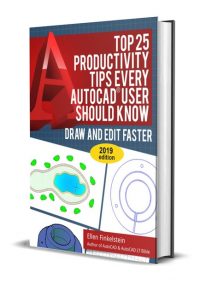Keyboard shortcuts can make your work go much faster. You can use the default keyboard shortcuts and create your own.
Here are the defaults that come with AutoCAD:
F1: Displays Help
F2: Toggles the Text Window
F3: Toggles OSNAP
F4: Toggles Tablet mode
F5: Toggles ISOPLANE
F6: Toggles Dynamic UCS
F7: Toggles GRID mode
F8: Toggles ORTHO mode
F9: Toggles SNAP mode
F10: Toggles Polar Tracking
F11: Toggles Object Snap Tracking
F12: Toggles Dynamic Input
CTRL+0: Toggles Clean Screen
CTRL+1: Toggles the Properties palette
CTRL+2: Toggles the DesignCenter palette
CTRL+3: Toggles the Tool Palettes Window
CTRL+4: Toggles the Sheet Set Manager
CTRL+6: Toggles the dbConnect Manager
CTRL+7: Toggles the Markup Set Manager
CTRL+8: Toggles the QuickCalc calculator palette
CTRL+9: Toggles the command window
CTRL+A: Selects all objects in the drawing
CTRL+SHIFT+A: Toggles Groups
CTRL+B: Toggles Snap mode
CTRL+C: Copies objects to Clipboard
CTRL+SHIFT+C: Copies objects to Clipboard with Base Point
CTRL+D: Toggles Dynamic UCS
CTRL+E: Cycles through isometric planes
CTRL+F: Toggles running object snaps
CTRL+G: Toggles the grid
CTRL+H: Toggles PICKSTYLE
CTRL+I: Toggles COORDS
CTRL+J; CTRL+M: Repeats the last command (pressing Enter does the same)
CTRL+L: Toggles Ortho mode
CTRL+N: Creates a new drawing
CTRL+O: Opens an existing drawing
CTRL+P: Prints/plots thecurrent drawing
CTRL+R: Cycles through layout viewports
CTRL+S: Saves the current drawing
CTRL+SHIFT+S: Opens the Save As dialog box
CTRL+T: Toggles TABLET mode
CTRL+V: Pastes data from the Clipboard
CTRL+SHIFT+V: Pastes data from the Clipboard as a Block
CTRL+X: Cuts objects to Clipboard
CTRL+Y: Cancels the preceding Undo action
CTRL+Z: Reverses the last action
CTRL+[; CTRL+\: Cancels the current command (pressing Esc does the same)
CTRL+PAGE UP: Moves to the next layout tab to the left of the current tab
CTRL+PAGE DOWN: Moves to the next layout tab to the right of the current tab
ALT+F11: Displays the Visual Basic Editor
ALT+F8: Displays the Macros dialog box
You can create your own keyboard shortcuts. See my tip, “Create a custom keyboard shortcut” for the detailed steps.
- Combine or subtract 2D shapes to create custom shapes - February 17, 2022
- Working with linetype scales - January 18, 2022
- Rename named objects–blocks, dimension styles, layers, and more - December 21, 2021

 Instagram
Instagram LinkedIn
LinkedIn Facebook
Facebook 
The CUI in Autocad 2015 would not let me assign Osnaps to the function keys as I have done in the past. So went back to an older way of doing it using an Accelerator menu (I used this method in Autocad releases prior to the CUI such as Autocad 2000). Here’s the menu file I created:
***MENUGROUP=F-Keys
***TOOLBARS
***ACCELERATORS
[“F2”]int
[“F3”]end
[“F4”]nea
[“F5”]per
[“F6”]mid
[“F7”]ins
[“F9”]cen
[“F11”]quad
[“F12”]node
Save it as F-Keys.mnu, place it in the Autocad support folder and use the MENULOAD command to load it. Keep in mind that the default Autocad function key definitions are “over written”, but in my instance I never used any of them except F1 and F8.